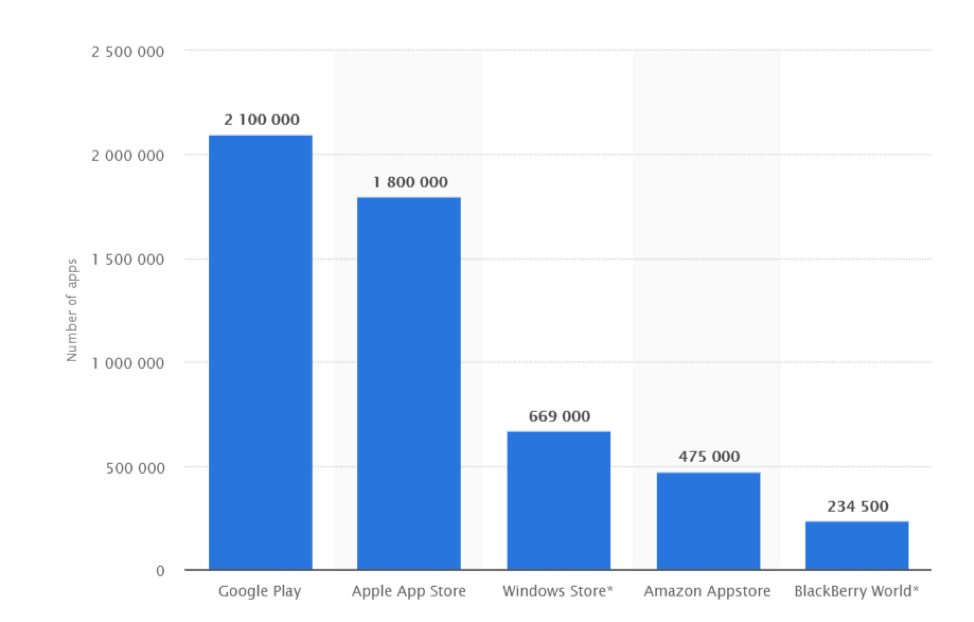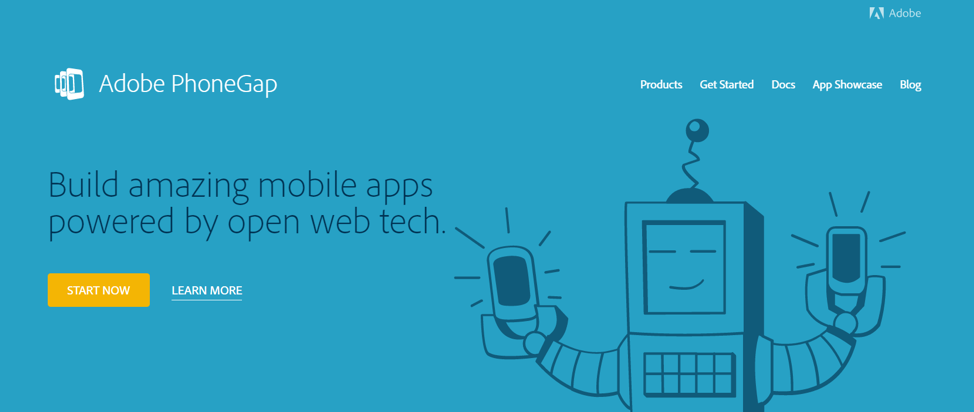

Updated January 3, 2025
Building a successful mobile app for your business is not an easy task. Many business owners tend to make common mistakes that directly affect the outcomes.
A mobile app can be a goldmine of your business. It can help you optimize your marketing efforts, sales, revenue, and internal business processes. Having a mobile app for your business means you can target a whole new set of audience and generate new streams of income.
However, it's not as straightforward as it may seem. According to Statista, there are already more than 3 million apps on Google Play Store and Apple Store combined.
Looking for a Mobile App Development agency?
Compare our list of top Mobile App Development companies near you

While, in total, Google Play Store and the Apple Store have the most apps, there are more Android applications in the Google Play Store than iOS applications in the Apple Store.
So how do you make sure that your mobile app stands out in the crowd and provides the real competitive edge to your business? Avoid the typical app development mistakes business owners make.
Many business owners approach us with an "awesome" mobile app idea for their business. Mobile apps can help expand the customer base, but developing an app that has no demand is a terrible mistake.
Mobile app development is a time-consuming and expensive process. If no one ends up using your app, it could put a big financial burden on your business.
You need to clearly define your business objectives and see if the app fulfills those objectives. Businesses want users to connect and make purchases through their app.
The first step is to figure out the problem areas of your business and the requirements of your customers. Then see if a mobile app can fix the issues and live up to customers' expectations. If yes, then continue with the app development process.
This goes in line with the above point. Business owners have to do enough research before deciding to develop a mobile app. Remember, every business and app development process has a different set of objectives. You’ll have to consider a large number of factors before starting.
Never jump to the conclusion based on your Google research. Think of the primary objective of your app, the nature of your business, target audience, competition, and your unique selling proposition (USP).
When it comes to developing a mobile app for your business, thorough research can help you save tons of money.
Setting a non-realistic budget is another common mistake people make.
Developing a custom mobile app means you have to hire a team of developers, designers, and app marketing experts. Plus, the development process can take a few weeks or a couple of months, based on the features, functionalities, and the overall complexity of your app.
Mobile technology is changing day by day with the introduction of new technologies like artificial intelligence (AI), virtual reality (VR), and augmented reality (AR). It makes the development process even more complicated and time-consuming.
Perform market research by receiving quotes from different companies and freelancers. This will give you an idea of what you will potentially spend.
Building a mobile app for your business is no small expense. There are some cheaper options available, but they don't guarantee the best results. Make sure you discuss requirements and objectives with the developer before finalizing the budget.
It's important that to clearly communicate your expectations in the beginning.
The best way to avoid confusion is to explain to the developer what exact features you need within the app, and with the help of visuals. Start by creating flowcharts, diagrams, and sample sketches of the screens so that the designers and developers get the idea.
Explain each element in the sketch, what should happen when users click a specific button, which screen should appear after a particular activity, and everything that you want in the app.
This will also help you in setting up a realistic budget as the developers know exactly what needs to be accomplished and how much time it would take.
It's great to have an app that has some unique functions and features. But, wanting an app with all the features you can think of is not a smart move.
Remember that every new feature is going to add up to the cost and time of development. The budget for developing an app with multiple functions is going to cost more than that of a simple app.
Additionally, you don't know for sure that these extravagant features are going to be useful for the customers.
That's why you should first start with an app that serves the primary purpose of your business. You can then slowly introduce new features, update and optimize them based on users' feedback.
Not developing an efficient cross-platform strategy is another common mistake. Gone are the days when it was smart to build a mobile app only for a single platform.
Today, with the help of advanced cross-platform mobile app development tools, developers can simultaneously build apps for both Android and iOS. Developers can use single source code to deploy on multiple platforms. PhoneGap is one such tool that developers can use for building cross-platform applications.

Keep in mind that there are some drawbacks to developing a cross-platform mobile app, but it is a viable option when you have a limited budget. It will also help you test the market and decide whether to stay with the hybrid app or go for a native app.
Having an awesome mobile app with a terrible user experience won't be of any help. You need to make sure that you're developing an app with a focus on your customers' needs and not just the design.
User experience plays a vital role in engaging and improving your customer base. Make sure the app design is fluid and straightforward, allowing users to navigate through various screens swiftly. Build an app with an end-user objective in mind, not the one that just serves your business objective.
The apps that fulfill the primary business purpose while providing excellent user experience can go a long way in improving your business.
Before investing your money, time, and efforts in app development, take some time to plan the marketing strategy. Getting an app built is one, but reaching out to the right people for app downloads is a whole different game.
There's a huge competition in the app stores as thousands of apps are getting released every day. It is nearly impossible for your app to sell itself unless you have a solid app marketing plan.
Research your audience, optimize your app storage page, get reviews to your app, socialize your app, use influencers to promote your app to market your app effectively.
Mobile app development is going to be one of the significant investments of your company, so it shouldn’t be handed over an inexperienced team. Vet carefully because you’re getting what you pay for. Sometimes it’s better to invest more into a trustworthy and credible firm with the capabilities and experience needed to create a top-quality product.
Additionally, developing a mobile app is an ongoing process. There will be multiple revisions until you get the final app ready to launch. It's all about making things better step by step. And, when you have an experienced team of developers, you can reach a successful app much faster.
Make sure the app development company has an in-depth understanding of your business, design and development expertise, and best testing practices. Ask the development company to show their previous work, check out the reviews and clients they've worked for.
Be smart and do your best to avoid mistakes to make the right development choice.


